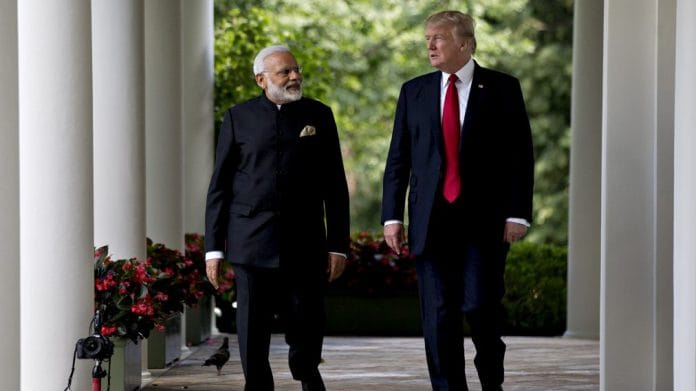If there is one election besides the Indian Lok Sabha elections that the policymaking community in New Delhi watches closely, it is the US presidential election.
While New Delhi is calm and confident that there is bipartisan support for India-US partnership in Washington, and is less anxious compared to America’s traditional allies in Europe, the shape of things that might come with a Donald Trump sequel does warrant an assessment.
Strategic congruence
Clearly, in the current circumstances, the India-US strategic partnership enjoys a positive arc that only a core group of America’s traditional allies can boast of. The current geopolitics of the Indo-Pacific, largely shaped by China’s assertive rise, has lent a strategic congruence to India-US ties unlike anything seen in their bilateral history. The immediate imperative to counteract China’s comprehensive power will continue to guide the multi-faceted relationship that New Delhi and Washington has managed to build bilaterally and with like-minded partners, such as in the Quadrilateral Security Dialogue (Quad).
Roughly two decades ago, it would have been hard for anyone to think of the extent to which these two countries engage from defence to infrastructure, from new technologies to public health, and from outer space to maritime security. Both sides have walked the extra mile to upgrade defence ties to aspire for co-development and co-production. Therefore, under the Trump presidency, creating greater synergy between the defense industrial conclaves of the two countries under mechanisms like the India-US Defense Industrial Roadmap and India-US Defense Acceleration Ecosystem (INDUS-X) will occupy prime spots. Moreover, overarching agreements like the Initiative on Critical and Emerging Technology (iCET) show a multi-sectoral and multi-agency partnership on commercial and military technologies.
America’s collision course with China, on issues ranging from Taiwan to trade and technology, will continue to be a driving factor of Trump’s Indo-Pacific strategy, but with transactional characteristics of his ‘America First’ outlook. On the other hand, New Delhi has its own playbook for dealing with Beijing on trade and the border dispute. Therefore, how New Delhi and Washington frame their terms of endearment on the China challenge under a Trump 2.0 will be germane to the future of India-US partnership in the Indo-Pacific region.
Carrying forward the strides made by his predecessor President Barack Obama, the Trump administration in its previous avatar took ahead many military-to-military interoperability initiatives and boosted India-US defence trade and technology cooperation—momentum that the Biden administration carried forward, like a relay race.
Also read: A Donald Trump presidency threatens Indian economy. Just see his record
India-US ties can’t be on autopilot
Much has changed in the world since the last time Trump sat in the Oval Office. The war in Ukraine and the Israel-Hamas war that has now morphed into a regional crisis sees no sight of immediate resolution. In India’s close neighbourhood, Myanmar is reeling under a civil war, Bangladesh is in the middle of an uncertain regime transition and America’s chaotic withdrawal from Afghanistan and the return of Taliban is an incomplete script. Moreover, in the Himalayas and in the Indian Ocean Region, New Delhi needs to navigate the knock-on effects of the US-China rivalry besides finding its own answers to China’s growing footprints in its immediate vicinity.
Trump 2.0 will have a new foreign policy and national security team, and the role of the US State Department’s regional bureau handling South Asia will have a complex minefield to cover in taking forward India-US diplomatic convergences and translating them to tangible cooperation amid regional challenges. The US is a distant power in South Asia in terms of geography, but not in terms of strategy. Therefore, as Washington navigates South Asia post two decades of shaping its regional policy amid the war in Afghanistan, how the region features in India-US partnership will be a crucial question for the Trump presidency.
Broader strategic developments like the growing animosity between US and Russia amid the Ukraine war, and India’s penchant to practice its autonomy and balance between Russia and Ukraine, will come with its own set of risks and opportunities. Trump had made an outlandish promise of ending that Russia-Ukraine war in 24 hours. In addition, with the West Asia crisis now directly involving Israel and Iran—both close partners of India—Trump’s initial responses to the situation will create new permutations and combinations for India’s West Asia strategy. Besides, how the new Trump presidency responds to the growing Russia-China alliance and their anti-American diatribes will require some strategising among the Indian foreign policy and national security mandarins.
The trade aspect will perhaps see a more marked difference with Trump’s ascendency. A Trump 2.0 will most probably be more disdainful of multilateralism, and focused on reciprocity of trade and tariffs, irrespective of allies and adversaries. Trump, during his presidency, and more recently as well, has often called out India as a “very big abuser” of tariffs. It will also be important to follow the first signals from the Trump presidency on the US-led Indo-Pacific Economic Framework (IPEF), of which India is a member.
A stark reality to keep in mind, while dealing with Trump 2.0, is that the US is a global power with a foreign policy and national security scope significantly broader than that of India’s. The India-US relationship, as such, will go through its misalignment in mutual expectations. Therefore, New Delhi and Washington under Trump 2.0 will have to leverage the positive momentum built in the relationship, to stitch together a partnership that is aspirational yet grounded in realpolitik.
Monish Tourangbam is Director at the Kalinga Institute of Indo-Pacific Studies (KIIPS), India. Views are personal.
(Edited by Ratan Priya)







De-dollarisation advocates will now be silent for 4 years